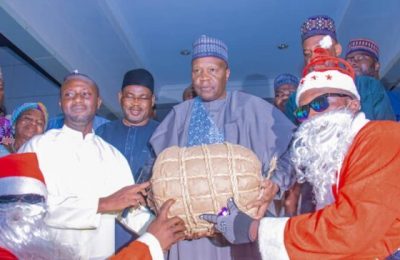
Former Nigerian Vice President Atiku Abubakar on Sunday, presented a detailed vision of policies he would have implemented if he were at the helm of Nigeria’s leadership, highlighting his plan to alleviate the economic strain on Nigerians, improve fiscal management, and boost public trust in government policies.
Addressing widespread concerns about the country’s economic challenges, he underscored the importance of a carefully sequenced approach to economic reforms, criticizing what he described as President Bola Tinubu’s “trial-and-error economic policies.”

He emphasised that his administration would have focused on a structured and phased approach to avoid overwhelming the economy and causing undue hardship.
The presidential candidate of the Peoples Democratic Party (PDP) in the 2023 election, argued that the Tinubu administration’s simultaneous removal of subsidies, currency devaluation, and abrupt reforms risked destabilising key sectors, further intensifying the cost-of-living crisis.
“We would have taken a step-by-step approach, ensuring that fiscal and monetary policies are aligned,” he stated, asserting that reforms such as exchange rate adjustments, electricity tariffs, and fuel prices should be rolled out gradually to reduce economic shocks.
“Central to his economic policy would have been the establishment of an Economic Stimulus Fund (ESF) with a projected initial capital of $10 billion. This fund, he explained, would support Micro, Small, and Medium Enterprises (MSMEs) across sectors, aimed at stimulating local production, creating jobs, and driving economic growth.
Atiku expressed confidence that this measure would stabilise the economy by empowering small businesses, thus reducing dependence on imports and helping mitigate unemployment.
The former vice president also addressed Nigeria’s urgent security concerns, highlighting that reforming security institutions and enhancing welfare for personnel would have been top priorities.
His policy document, “My Covenant With Nigerians,” outlined a “Special Presidential Welfare Initiative” intended to boost morale and operational efficiency within Nigeria’s security forces.
Atiku’s approach would have relied on diplomacy and alternative conflict resolution methods, involving traditional leaders and neighboring countries in joint security efforts.
He underscored that his administration would have also reformed the public sector to eliminate inefficiencies, address institutional weaknesses, and enhance government accountability. For example, he proposed the creation of an Infrastructure Development Unit (IDU) directly under the presidency.
He said this unit would expedite projects through public-private partnerships, with a target fund of approximately $25 billion dedicated to infrastructure advancement.
Atiku reaffirmed his long-standing advocacy for subsidy removal, criticizing its “opaque” administration, which he claimed provided vast profits to an elite few within both public institutions and the private sector.
However, he insisted that the approach to subsidy reform should be gradual to minimise disruptions, advocating a phased strategy similar to those adopted by countries like Malaysia and Indonesia.
He recalled that, as Vice President, he had initiated a gradual subsidy phase-out, though subsequent administrations failed to continue the effort.
The former presidential candidate of the main opposition argued that the abrupt removal of subsidies without adequate mitigation plans has further exacerbated Nigeria’s economic difficulties.
Instead, he proposed reinvesting subsidy savings into infrastructure, healthcare, and education, while creating a social protection program to cushion low-income citizens from the impact of reforms.
Regarding foreign exchange, Atiku criticised the current administration’s handling of the multiple exchange rate system, arguing that it primarily benefits opportunists and arbitrageurs.
His solution would have been a managed-floating exchange rate system, a middle ground between fixed and floating rates, to maintain stability while supporting an open, market-friendly economy.
Atiku emphasised the need for transparent, empathetic leadership, stating that he and his administration would have prioritised consistent communication with the Nigerian people.
According to him, transparency is crucial to building public trust and ensuring that citizens understand government policies and their intended benefits.
He argued that any reforms should be accompanied by robust social protection programs to safeguard the vulnerable population, rather than what he called a “palliative economy”.
The Wazirin Adamawa offered his ideas not as criticisms but as potential solutions the Tinubu administration could consider.
He suggested that implementing such measures could provide a pathway out of Nigeria’s current economic and social difficulties, emphasising that leadership should embody empathy, transparency, and accountability.
“Nigerians are looking for alternatives because they need policies that work.
“While I am not the President, I hope my ideas can serve as a guide to bring relief to the Nigerian people,” he said.
ALSO READ THESE TOP STORIES FROM NIGERIAN TRIBUNE







